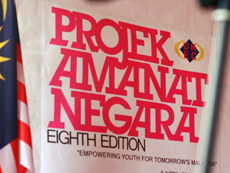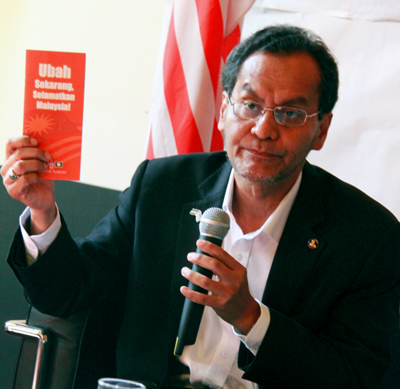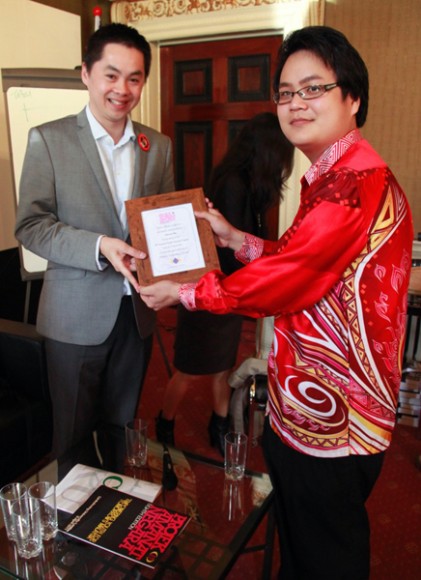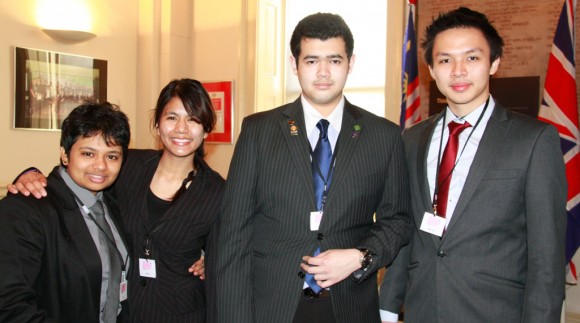IS the Federal Constitution secular or Islamic? Are the prime minister’s New Economic Model and Government Transformation Programme all they are cracked up to be? And what about corruption in Malaysia? Big questions, these, with discussions amongst politicians often ending up bitter, polemical and unyielding. Not to mention the name-calling, character assassinations and government muzzling of critical individuals and organisations.

Therefore, it was with great curiosity and slight apprehension that I accepted an invitation to speak at the United Kingdom and Eire Council of Malaysian Students (UKEC)’s Projek Amanat Negara (PAN). Held in London, PAN aims to “spur intellectual discourse amongst Malaysian youth studying in the United Kingdom and Ireland”. Thus, on 9 Apr 2011, I walked into the halls of Limkokwing University of Creative Technology in Green Park at 8am to be greeted by an army of bright-faced Malaysian students in business suits.
How would the students fare when discussing the “big issues” of our nation? I must confess that during my own undergraduate days in Melbourne, Australia in the late 1990s, it was, shall we say, difficult to drag me to any conference of Malaysian students. Not so with PAN. PAN (and UKEC) confirmed that my excitement and optimism about Malaysia and Malaysians are justified, albeit with a need for more empirical confirmation. Let me explain.
Pan-Malaysian solidarity

First of all, how could I not love a group of bubbly young Malaysian students who took such pains to organise a day-long conference as their commitment to nation-building? And this was not some Biro Tatanegara-type camp. This was a conference explicitly discussing whether the Federal Constitution is secular or Islamic, where the country’s economy is headed, and what to expect in the next general election. And UKEC invited the likes of PAS’s Dr Dzulkefly Ahmad, former Kedah Menteri Besar and Umno vice president Tan Sri Sanusi Junid, former de facto law minister Datuk Zaid Ibrahim, and human rights activist Edmund Bon of LoyarBurok and MyConstitution fame to share their candid views.
Sure, these discussions did get tense, not least because of the presence of a few older, critical Malaysian migrants to London who locked horns with a few speakers. But my commentary is not concerned with them. What I found remarkable throughout this event was how younger Malaysians, students all, listened calmly to all the ideas being discussed, and then asked pointed and critical questions of their own.

And for Malaysians who advocate an inclusive Malaysia that embraces diversity, the UKEC, which represents over 6,500 Malaysian students, provides an encouraging model of participation and leadership. The names of UKEC’s office bearers embody the functioning diversity of the group — the chairperson is a Farquar Haqqani, his deputy is a Tai Zee How, one of their vice-presidents is a Roshan Mark Singh Sidhu, and the editor of their magazine is a Natasha Su Sivarajah. Aren’t these wonderfully Malaysian names? Besides, I could also detect ideological diversity among the students there, which is noteworthy.
To check whether this was diversity imposed from the top down, I tried to hang out in the hallways and listen to conversations in between sessions. I also made it a point to lepak with the student organisers after the conference. The young men and women I hung out with were not only comfortable being Malaysian, with the delicious elasticity and ambiguity that the concept entails, but they were also hilarious. They had a sense of humour, and if we want to see sustainable change in Malaysia, I believe we also need to be able to laugh with each other good-naturedly.
Broken sociological record
Why am I so excited about a bunch of urban, elite young Malaysians, you might ask? That’s a valid question – most of the current UKEC bunch consists of bright young things who are studying under impressive state and corporate scholarships. How representative are they of general trends in Malaysian society? But can we define what “representative” means? Or you might ask, will they not eventually get co-opted by The System? My question is: can we define “co-optation” and “The System”?

See, the issues of such sombre and current importance in Malaysia have been there for at least the past four decades. Back in 1976, social scientist Daniel Regan was already hinting, through empirical research, that race and religion would only become more politicised in post-independence Malaysia. Anthropologist Prof (Emeritus) Judith Nagata corroborated Regan’s observations in 1980, observing for instance that Hindu temples were being attacked in West Malaysia in the late 1970s by advocates of a certain brand of Islamism.
So, the tensions we are seeing in Malaysia now with regard to authoritarian government and racial and religious tensions are not exactly new. What is arguably new is the emergence of voluntary organisations composed of a young and diverse assembly of Malaysians, such as UKEC. As Regan observed in 1976, “Mixed or integrated societies [in Malaysia] are scarce, and those that exist are less stable than those formed along strict religio-ethnic lines.” This is one of the reasons why he was not optimistic that trans-religious and trans-ethnic solidarities could organically emerge in Malaysian society. Thirty-five years on, I wonder if I have caught a glimmer of exactly the kind of trans-religious and trans-ethnic relationships that eluded Regan’s findings.
Measured optimism
Of course, I admit that this is hardly evidence of a revolution in the making. Besides, there are issues that UKEC needs to work out as well. For example, how is it going to grow women leaders within its ranks, and how is it going to ensure gender balance among its panel speakers in the future? How is it going to create connections with other Malaysian students back in Malaysia or in other countries? However, based not only on PAN as it was officially presented and documented, but also on the sorts of informal interactions and relationships I observed, I have faith.

My faith does not rest on UKEC alone — let’s not endow it with messianic and millenialist powers it does not and should not have. What I mean to say is I’ve seen these dynamics before among other configurations of younger Malaysians. However, my examples must remain merely anecdotal for now. Furthermore, some of us who have observed these dynamics where diversity was celebrated, might have thought they were one-off or inconsequential. And who could blame us for thinking these are isolated and inconsequential moments when the news headlines and political blog posts are often so depressing and bitter?
Here’s the thing, though: depressing news is important. It forces us to reckon with the journey Malaysia needs to take to become a truly just and democratic society. But if we fixate only on the depressing and allow ourselves to become embittered, we miss out on other interesting and hopeful developments that, frankly, are not headline material, such as UKEC’s PAN event. These are no less important developments, because they tell us that the nation can be built and continues getting built regardless of an environment of enduringly rubbish politics. ![]()
Shanon Shah spoke at the 8th PAN on leadership and career building, along with Tunku Danny Nasaifuddin Tunku Mudzafar and Prof James Chin.


Kong Kek Kuat says
@ Shanon
Unless these supposedly bright minds are slotted in at the top part of the Malaysian pyramid when they return, they will eventually end up like the rest of those who never quite fulfilled their potential.
Using the Malays as an example, I am witness to BTU students who – having not bought into “you are Malaysian when overseas”) came back with bright eyes and ended up with dim-eyed after years of being hammered by the sheer weight of the middle and bottom parts of the Malaysian pyramid. There are a few exceptions, of course, but how many out of every batch of BTUs?
Some even go to the extent of staying away from their sponsors for fear of being influenced by their sponsors´ culture and ethics, which they conclude are bad for them and would undo what they had done while learning in another culture. But they eventually get hemmed in, anyway.
Unlike you, I would remain measurably pessimistic even in the face of these ‘bright eyes’ as I realise the depth of the current culture is entrenched in the system we call Malaysia. There´s still hope in places like Sarawak, but how many and for how long?
Kong Kek Kuat says
Dear Editors,
I think you have mistaken my statement “you are Malaysia when overseas” with “you are Malaysian when overseas.”
I meant the former, i.e. “you represent the élite/aristocrats of Malaysia when you are overseas.”
G Ayob says
The title of this article gives the problem away (“Building Malaysia in London” — we don’t need reminding that London is a long way away from Kota Baru, and not just in a geographical sense!). Educated liberals can keep talking and laughing amongst themselves, while meanwhile Islamist forces continue to encroach on the judiciary, state legislatures and the executive. In so doing, they reinforce orthodox and parochial assumptions that the masses are told are “Islamic”, making any genuine shift to a liberal economy & society via the electoral process even more difficult.
All this article shows is that there are two Malaysias, and I’m afraid the regressive Malaysia has numbers on its side. What we really need is to engage the voting masses directly – for example, someone needs to speak their language and show them there are numerous ways of being a good Muslim, and that not everything an ulama says is necessarily true. And in doing this, we need to ask why organisations that are already offering alternative visions (like Sisters-in-Islam) have failed to gain widespread trust and credibility. The power to make claims that are seen as knowledgeable is, I am afraid, not evenly distributed. Therein lies one of the most serious difficulties we face, and liberals talking to liberals alone isn’t going to move us any closer towards addressing this problem.
Shanon Shah says
All valid points. However, there is a difference between being a “liberal” and being part of an elite. My argument is that these students are definitely part of an elite, but they do not necessarily represent a homogenous “liberalism”. As an elite, there is a huge possibility that they will only continue to move within an elitist bubble in life. However, there is also a possibility for them to become carriers of ideas and ideals, something I hope they will do once they enter into the world after they graduate.
London and Kota Baru are two different places, whether in terms of geographical location or cultural constituency. However, to then juxtapose this against a “regressive”, “Islamist” Malaysia that has the “numbers” (and is portrayed as a homogenous entity) is problematic.
This example of student organising in London is not meant to be representative of mass movements in Malaysia. It is merely an example of the many processes that are taking place among some younger Malaysians, despite state or party political propaganda. Edmund Bon had some interesting examples of the kind of ideological diversity among young people his MyConstitution campaigners are addressing.
Certainly, politicisation of a very hierarchical and defensive interpretation of Islam is a dominant institutional and some would argue social trend. But perhaps being curious about other counter trends and seeking to understand their dynamics a bit better before dismissing them as merely “liberals talking to liberals” would be more constructive.
Adam says
Of course our Federal Constitution is secular and not Islamic. But, the constitution has accorded Islam as the national religion and other religions could be practised freely.
For a nation to progress and its people to be united, it must remain secular and not religious. Religions are all about rituals, spirituality and relationships between the adherents and their respective god(s). So, we cannot expect much progress to come out of religions.
Malaysia must remain secular to progress, as otherwise, it will stagnate and be left far behind in this modern age of technology and innovation. Religions could still play an important part on a personal level.
So, we must educate our younger generations on this wherever they are. Catch them young; in schools, in higher institutions, or even in their workplaces. Unfortunately, our present education system does not prepare our students to be global players, and BTN courses make it worse. Thus, we have the need to catch them overseas I guess. Not only in London but all over the world where you can find them.
rhealyn says
Thank you for this inspiring piece. Living abroad draws communities and people together. This community-based [effort] will be what reforms our lives as we come to share our assets instead of deifying individual ownership of everything.